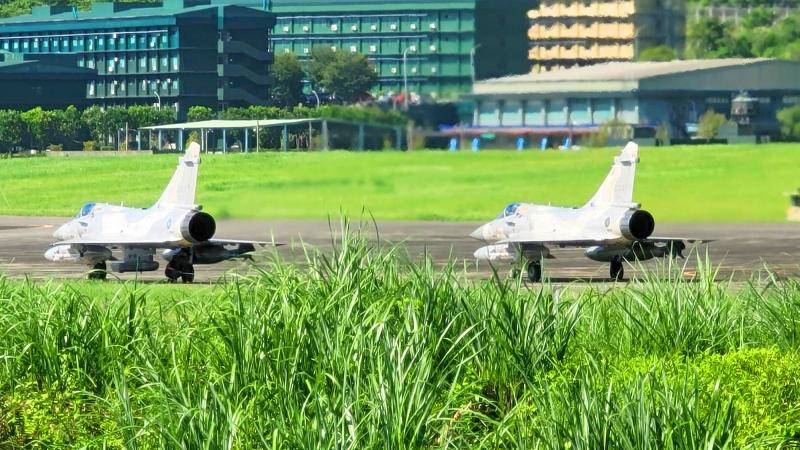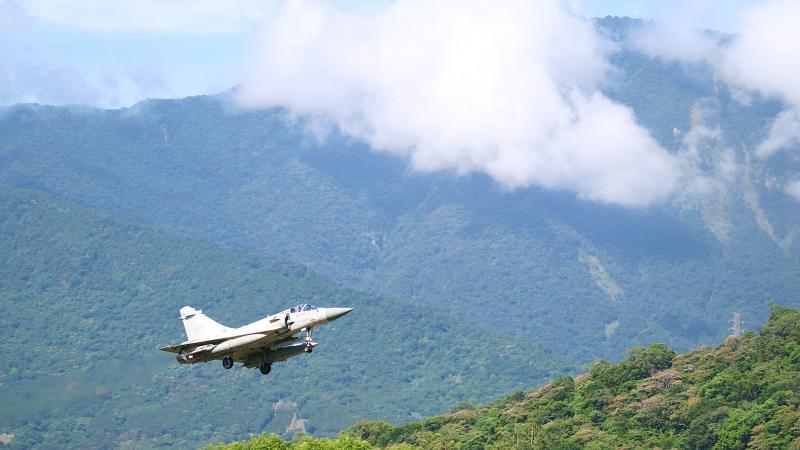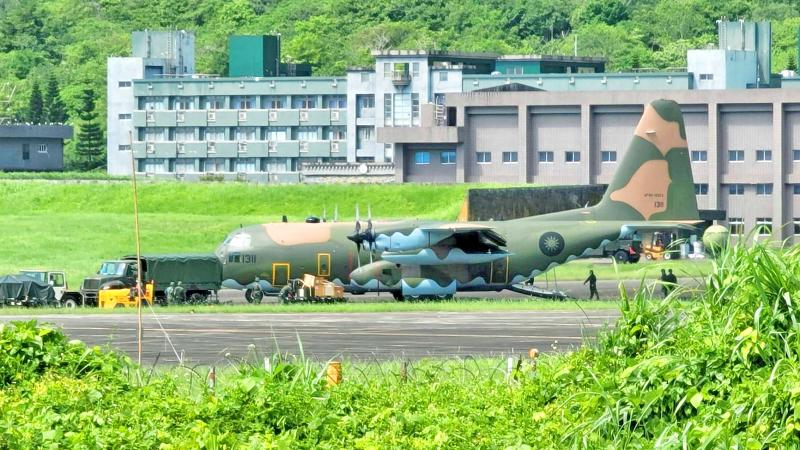The live-fire component of this year’s annual Han Kuang military exercises, Taiwan’s major war games involving all military branches, began yesterday morning and is to run until Friday to test the armed forces’ capability to fend off a Chinese invasion.
The 37th edition of the annual event officially began after the Ministry of National Defense’s Joint Operations Command Center, also known as the Hengshan Command Center, announced the initiation of the five-day live-fire drills.
Yesterday’s drills were focused on testing the military’s preservation and maintenance of combat capabilities in the event of a full-scale Chinese invasion.

Photo: CNA
As part of the drills, air force fighter jets that were originally deployed in the western part of Taiwan were dispatched to Hualien Air Base in the east in a simulation of an invasion, a military source said.
Military C-130 transport aircraft also sent military personnel responsible for fighter jet maintenance, together with related equipment and supplies, to designated locations in eastern Taiwan early in the day, the source said.
Another source said that the aircraft included F-16Vs and Mirage 2000s, while Indigenous Defense Fighter jets were dispatched to air bases in western Taiwan.

Photo: CNA
Meanwhile, all of the nation’s major naval vessels left their home ports and sailed to designated locations off the coast in preparation for confronting enemy forces.
The ships’ early departure is a preventive measure in anticipation of enemy bombardment of Taiwan’s ports, a military source said.
A biological agent containment exercise was also held in southern Tainan, in response to a mock assault where troops were assumed to be attacked by bioweapons.

Photo: CNA
Soldiers were promptly sent to nearby hospitals for simulated treatment by civilian doctors.
The military also rehearsed its procedures for the decontamination of vehicles and equipment during the drill.
President Tsai Ing-wen (蔡英文) yesterday wrote on Facebook that the exercises constituted a solid foundation for the nation’s security.
This year’s exercises in particular are aimed at showing the world the armed forces’ resolve in protecting the nation, she wrote.
The Han Kuang exercises have been held annually since 1984 in the form of live-fire drills and computerized war games.
This year’s tabletop drills were held from April 23 to 30.
The live-fire exercises were originally scheduled to start on July 12 and run for five days.
However, due to a domestic outbreak of COVID-19, the military postponed the live-fire component of the drill and rescheduled it for this week.
The scope of the drills has also been scaled down to contain any possible spread of the virus.

INVESTIGATION: The case is the latest instance of a DPP figure being implicated in an espionage network accused of allegedly leaking information to Chinese intelligence Democratic Progressive Party (DPP) member Ho Jen-chieh (何仁傑) was detained and held incommunicado yesterday on suspicion of spying for China during his tenure as assistant to then-minister of foreign affairs Joseph Wu (吳釗燮). The Taipei District Prosecutors’ Office said Ho was implicated during its investigation into alleged spying activities by former Presidential Office consultant Wu Shang-yu (吳尚雨). Prosecutors said there is reason to believe Ho breached the National Security Act (國家安全法) by leaking classified Ministry of Foreign Affairs information to Chinese intelligence. Following interrogation, prosecutors petitioned the Taipei District Court to detain Ho, citing concerns over potential collusion or tampering of evidence. The

Seventy percent of middle and elementary schools now conduct English classes entirely in English, the Ministry of Education said, as it encourages schools nationwide to adopt this practice Minister of Education (MOE) Cheng Ying-yao (鄭英耀) is scheduled to present a report on the government’s bilingual education policy to the Legislative Yuan’s Education and Culture Committee today. The report would outline strategies aimed at expanding access to education, reducing regional disparities and improving talent cultivation. Implementation of bilingual education policies has varied across local governments, occasionally drawing public criticism. For example, some schools have required teachers of non-English subjects to pass English proficiency

‘FORM OF PROTEST’: The German Institute Taipei said it was ‘shocked’ to see Nazi symbolism used in connection with political aims as it condemned the incident Sung Chien-liang (宋建樑), who led efforts to recall Democratic Progressive Party (DPP) Legislator Lee Kun-cheng (李坤城), was released on bail of NT$80,000 yesterday amid an outcry over a Nazi armband he wore to questioning the night before. Sung arrived at the New Taipei City District Prosecutors’ Office for questioning in a recall petition forgery case on Tuesday night wearing a red armband bearing a swastika, carrying a copy of Adolf Hitler’s Mein Kampf and giving a Nazi salute. Sung left the building at 1:15am without the armband and apparently covering the book with a coat. This is a serious international scandal and Chinese

NEGOTIATIONS: The US response to the countermeasures and plans Taiwan presented has been positive, including boosting procurement and investment, the president said Taiwan is included in the first group for trade negotiations with the US, President William Lai (賴清德) said yesterday, as he seeks to shield Taiwanese exporters from a 32 percent tariff. In Washington, US Trade Representative Jamieson Greer said in an interview on Fox News on Thursday that he would speak to his Taiwanese and Israeli counterparts yesterday about tariffs after holding a long discussion with the Vietnamese earlier. US President Donald Trump on Wednesday postponed punishing levies on multiple trade partners, including Taiwan, for three months after trillions of US dollars were wiped off global markets. He has maintained a 10 percent